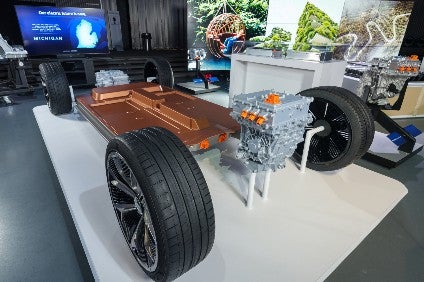
General Motors has shared its electric vehicle (EV) strategy at a special gathering of “hundreds” of employees, dealers, investors, analysts, media and policymakers.
The automaker has developed a modular propulsion system and a flexible, third generation global EV platform powered by proprietary Ultium batteries which, GM said, would “allow the company to compete for nearly every customer in the market today, whether they are looking for affordable transport, a luxury experience, work trucks or a high performance machine”.

Discover B2B Marketing That Performs
Combine business intelligence and editorial excellence to reach engaged professionals across 36 leading media platforms.
It claimed its new Ultium batteries are unique in the industry because the large, pouch style cells can be stacked vertically or horizontally inside the pack so battery capacity and layout can easily be tailored to each vehicle design.
Ultium pack sizes range from 50kWh to 200 kWh which, GM estimated, “could” result in range up to at least 400 miles on a full charge with 0 to 60mph acceleration in as little as three seconds.
Motors designed in house will support front and rear wheel drive plus regular and “performance” all wheel drive.
The Ultium EVs are designed for Level 2 and DC fast charging. Most will have 400 volt battery packs and up to 200kW fast charging ability while the truck platform will have 800 volts and 350 kW.
GM said its flexible, modular approach to EV development would drive significant economies of scale and create new revenue opportunities, including continuous improvement in [lowering] battery costs.
The joint venture with LG Chem will drive battery cell costs below $100/kWh (Kia Europe recently told just-auto such pricing was needed to enable ‘parity’ pricing of ICE and EV vehicles).
The cells use a proprietary low cobalt chemistry and ongoing technological and manufacturing breakthroughs will drive costs even lower.
The new global platform is flexible enough to build a wide range of trucks, SUVs, crossovers, cars and commercial vehicles with performance, packaging, range and affordability.
GM said it can spend less capital to scale its EV business because it is able to use existing land, buildings, tools and production equipment such as body shops and paint shops.
The vehicle and propulsion systems were designed together to minimise complexity and part count beyond current EVs which are less complex than conventional ICE vehicles.
The automaker plans 19 different battery and drive unit configurations initially, compared with 550 ICE powertrain combinations available now.
GM noted third party forecasters expect US EV volume to more than double from 2025 to 2030 to about 3m units on average.
It believes volume could be “materially” higher as more EVs are launched in popular segments, charging networks grow and the total cost of ownership to consumers continues to fall.
By vertically integrating the manufacture of battery cells, the company can reach beyond its own fleet and license its technology to others.
GM claimed the first generation of its future EV programme “will be profitable” and the first projects would pave the way for further growth.
The technology can be scaled to meet customer demand much higher than the 1m sales worldwide the company expects by mid decade.
Mary Barra, GM chairman and CEO, said: “[We have built] a multi brand, multi segment EV strategy with economy of scale that rivals our full size truck business with much less complexity and even more flexibility.”
The Chevrolet, Cadillac, GMC and Buick brands will launch new EVs starting this year. The next new Chevy EV will be a new version of the Bolt, launching in late 2020, followed by the 2022 Bolt EUV (electric SUV), launching summer 2021.
The EUV will be the first vehicle outside of Cadillac to feature Super Cruise, claimed as the industry’s first true hands free highway driving technology which GM will expand to 22 vehicles by 2023, including 10 by next year.
The Cruise Origin, a self-driving, electric shared vehicle, shown to the public in January 2020 in San Francisco, was the first product revealed using the new EV platform and Ultium batteries.
Next will be the Cadillac Lyriq luxury SUV in April.
The Ultium-powered GMC Hummer EV will follow on 20 May. Production is expected to begin in autumn 2021 at the Detroit-Hamtramck assembly plant, GM’s first assembly plant dedicated to EV production, which built the first Chevrolet/Opel/Vauxhall Volt range extender models.






